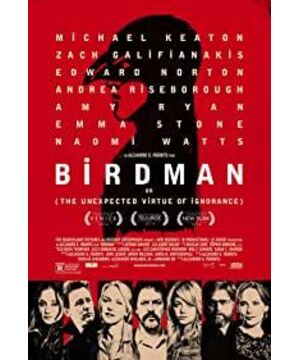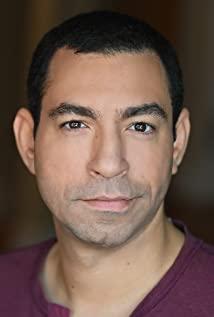This year's Oscar's Best Picture "Birdman" is quite in-depth in attacking the American film industry and drama industry. In the first half of the film, the star Mike played by Edward Norton stole the limelight of the protagonist Reagan. He is a believer in the performance style of the method school (Brando and De Niro are all actors of this school), and he makes every effort to pursue the truth and nature on the stage. Therefore, he was very annoyed at Reagan's exchange of fake wine for real wine, and accused Reagan's prop gun as not real (in fact, the audience can't see the gun's authenticity at all), and is still in the scene of cheating. Really got an erection. Obviously, his style is quite popular with film critics and audiences, but is he perfect? of course not. In an interview with the New York Times, Mike misappropriated Reagan's experience, claiming that he entered the acting world because of Raymond Carver. This shows that he knows how to play this game and how to please the critics. So, did his previous behaviors of forcing everything to be true, whether for performance or for grandstanding? It's hard to tell. The film's satire on the actors who are beloved by the public can be said to be inferior.
Mike's scene hurriedly ended after he was finally able to get an erection in the audience, and the focus of the movie returned to Reagan. Reagan, who was in distress, was under triple pressure from the studio, the critics, and himself. In the conversation with the critic Dickinson, the other party spoke nakedly. She just didn't want Reagan to succeed, and would write the harshest comment to ruin Reagan's future. In fact, the filming of this episode was quite overkill. In the real show business world, if a critic really dared to admit that he did not rely on the content of the work, and completely relied on his personal likes and dislikes to write reviews, he would have been accused and his reputation would have been dishonored long ago. Of course, in this scene, the director's intention was to satirize the polite critics. Because they couldn't get on the stage, they held a grudge and relied on bad reviews to cover up the fact that they were actually more incompetent.
Reagan's mentality also has a lot of irony. Due to space limitations, this article will not go into it. The point is, is the movie going to end here? Obviously not. In the climax part, Reagan also learned the authenticity of acting and blasted his nose with a real gun. This move easily touched everyone, and it also made Dickinson compelled to write an article to praise him. Reagan was a huge success, and even made up with his daughter. This ending can be said to be quite meaningful. After most of the film was used to satirize the fake ugliness of the American show business, the director reached a reconciliation with the show business in an almost happy ending.
In other words, fighting is still going to be fighting, but no matter how fierce the fight is, it must eventually reconcile with the mainstream. This is the trick that "Birdman" catered to the Oscar judges.
The film "Escape from Tehran" directed by Ben Affleck two years ago used a similar routine. The film satirizes Hollywood and satirizes the CIA. It can be said that the most terrible place is not Iran, but Universal Studios; if you want to pretend to be a big man in Hollywood and talk about it, you will actually do nothing. No flaws; the CIA's misjudgement of the situation is directly responsible for the capture of embassy personnel; the work of the U.S. government and the CIA is messy and erratic, almost killing the lives of six fugitives... These are of course the parts that the film focuses on. , But the focus is on the latter: through the joint efforts of the CIA and Hollywood, the fugitives were successfully rescued back to the United States, which suddenly reversed the bad images that the two left on most of the audience in the film. Through this method, the film enthusiastically embraced Hollywood and the CIA, and the idea of the film was suddenly elevated. Therefore, at the Oscars that year, it is not surprising that the film defeated the "young school" with a dark core and won the best film award.
Let’s talk about the superhero movies that have dominated the big screen in recent years. As they prosper, anti-superhero movies have also caught on. Last year’s "Guardians of the Galaxy" was the most successful one. It focused on portraying a few guys who didn’t look like superheroes at all. In the film, they almost always have no ambitions, only care about themselves, and we are used to it. The superheroes formed a huge contrast. But at the end of the movie, these guys have saved the world again, ah no, the entire galaxy, which makes the film more ironic on the one hand, and embraces the clichés of traditional superhero movies on the other. Moreover, the irony of the superhero in the whole film is only superficial, and it is not intended to be really flogged.
The two episodes of "King of Haibian" also made this routine familiar. First, we must focus on criticizing the delusion of mortals to become superheroes, and let the heroine run into a wall everywhere; even if he has a certain reputation, he will not withstand a blow when he encounters a real villain. But as the story progresses, the dead man still becomes a superhero through various coincidences. This kind of plot trend has certainly weakened the previous irony, but it is also a last resort. Otherwise, the film will not be able to not only escape the clichés of ordinary superhero movies, but also satisfy the audience's desire to see the protagonist become a god.
In contrast, the "defender", who is also an anti-superhero movie, loses structurally: there is only flogging, no hugs. The male protagonist in the film is a fan with abnormal brains and wants to be a superhero. After experiencing a series of failures in reality and careful psychological treatment, he finally... I'm sorry, he was killed by the bad guys, and he didn't become a superhero until he died. The consistent dark tone makes this film a masterpiece of realism. However, it is a pity that this kind of plot is difficult to gain emotional recognition from the audience, and the film ultimately failed miserably at the box office.
At this point, I think everyone has understood how a movie can be done, not only by jumping out of the inherent box to show new ideas, but also by returning to the box and shaking hands with clichés, to gain the approval of the audience and the critics. Next time, when we watch the Oscars, we won’t be surprised by this: Why are the best films always those with a deep beginning and a slightly superficial ending? Why do films that are sharp, sharp, and profound from start to finish always fail to win awards?
View more about Birdman or (The Unexpected Virtue of Ignorance) reviews











